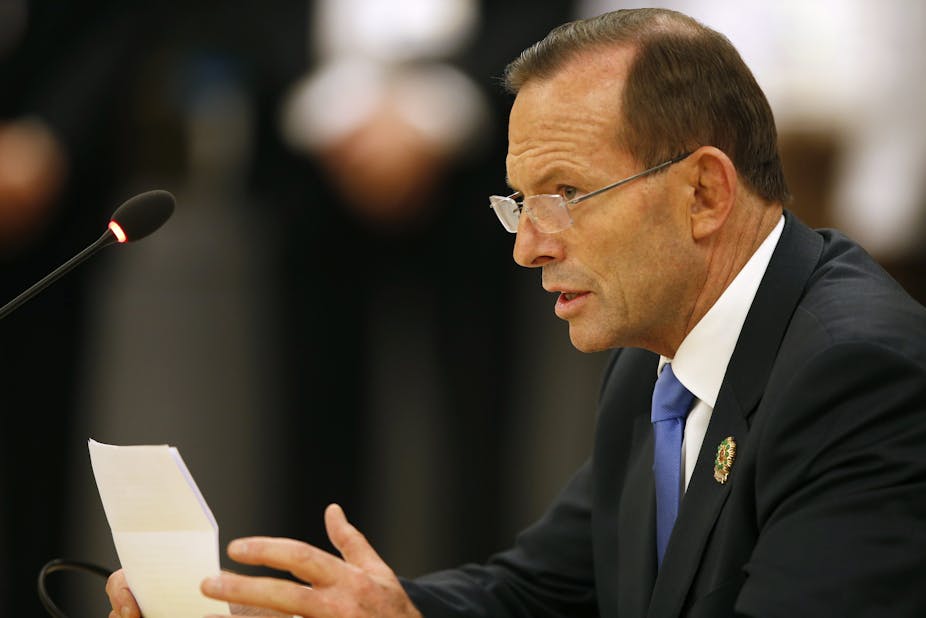Tony Abbott finds himself the party host caught somewhat off-balance as his guests set off crackers all over the place.
The government is – and has been all year – shouting that it wants this weekend’s G20 to be tightly focused on growth and jobs. Countries have had to produce action plans (some 1000 measures have been submitted), with a target of increasing global growth by 2% over the next five years above what it would otherwise have been.
Australia has wanted to keep the Brisbane summit strictly economic, narrowly defined. But now the high-profile questions of climate change and Ebola – seen as economic issues by many countries but downplayed on this score by the Abbott government – have muscled their way into the discussion.
Abbott is very grudging about it. “If other countries want to raise other subjects they’re entirely welcome to do so but my focus and I believe the principal focus of the conference will be on growth and jobs,” he said on Thursday.
This week’s headline-grabbing US-China deal on their post-2020 plans for curbing emissions has now put the climate issue on everyone’s lips.
Asked about the deal at his Thursday news conference in Myanmar, Abbott sounded distinctly off-key. He said he welcomed the agreement which had “apparently” been struck, and then proceeded to play down its importance: “As for Australia, I’m focusing not on what might happen in 16 years time. I’m focusing on what we’re doing now and we’re not talking, we’re acting”.
This ignored the fact that soon Australia will have to think about the longer term, because it too must unveil post 2020 targets for the 2015 Paris climate conference.
On Ebola, after considerable delay the government has recently announced an (outsourced) initiative to staff a hospital in Sierra Leone on the back of British efforts. It was pressured into acting, just as it has been pushed into an inevitable G20 discussion.
British Prime Minister David Cameron gave notice Ebola would be an important topic, tweeting:
On another front, after Abbott had said his piece to Vladimir Putin on the sidelines of APEC to put behind him the “shirtfronting” comment and minimise the distraction at G20, the presence of several Russian ships to Australia’s north has grabbed media attention. One can imagine the cackling in the Russian camp.
Trying to ensure a smooth G20 hasn’t been made any easier by Abbott being on the fly, first at APEC in Beijing and then at the East Asia Summit in Myanmar.
This round of summiteering has given him a good opportunity for discussions with a range of other leaders, but it complicated co-ordination and preparation for the Brisbane meeting and surely must leave him dog-tired.
After arriving back in Australia early Friday morning, Abbott will be in Canberra for Cameron’s address to federal parliament before flying to Brisbane to start a punishing schedule.
On Thursday, ministers did their best to put the best light on having to deal with changing circumstances.
Foreign Minister Julie Bishop – who’d got a hint in Beijing that something was in the wind on climate, but not any detail – said the government had been urging the major emitters, the US and China, to indicate what they would do.
Treasurer Joe Hockey agreed that “of course Ebola is a significant issue” and “I have no doubt it will be discussed by the leaders”.
It was the Labor government that secured the G20 meeting for Australia but opposition leader Bill Shorten is highly critical of how Abbott is handling the occasion.
In a Thursday evening address to the Sydney Institute, Shorten zeroed in on Abbott’s vulnerability on climate change. “Throughout this year, I and Labor have consistently advocated that climate change should be at the core of the G20 agenda,” he said.
“How can it be that just as the world’s biggest players change the game, Tony Abbott is doubling-down on denial, and dealing Australia out.
"I fear it will not be long before this stubborn isolationism takes a toll on our international competitiveness.”
Shorten said the US-China climate deal posed two questions for Australian foreign policy. Did Abbott still plan not to attend next year’s Paris climate conference? And, given that the world’s two largest economies chose an economic forum to announce their agreement and identified climate change as an economic issue, “how on earth can Tony Abbott argue that climate change is not central to the G20 agenda?”.
Shorten also attacked the government for including un-passed budget measures in Australia’s action plan. “Just as the world’s economies are recognising the centrality of fairness and inclusion, Tony Abbott offers up some of his budget’s most unfair and regressive measures as the core of Australia’s G20 ‘growth plan’.
"Surely Australia can offer the world’s leading economies something better than a GP tax, slashing support for jobseekers and a plan for $100,000 degrees?
"This narrow view, this ‘little Australia’ approach sells us short to the global community.”
Shorten will be in Brisbane at the weekend, ensuring that there will be a dose of domestic politics around the meeting.
The government will get the results it wants out of the G20 summit. The main issues of its agenda will have already been bedded down – the growth target, now expected to be a little more than 2%, the action plans, a commitment to fight international tax avoidance, an undertaking to ensure banking systems are stable enough deal with crises, a pledge to reduce gender inequality, and an infrastructure information-sharing “hub” to be located in Sydney.
The difficulty for Abbott is that these results – which are mostly promises countries may or may not eventually deliver on – could be overshadowed in the news that reaches the public by the issues the government considers of lower priority, and by whatever media circuses there are around Putin and other distractions.
The summit will be a test of Abbott’s political management in a setting where he’s not the only one with strong views.

